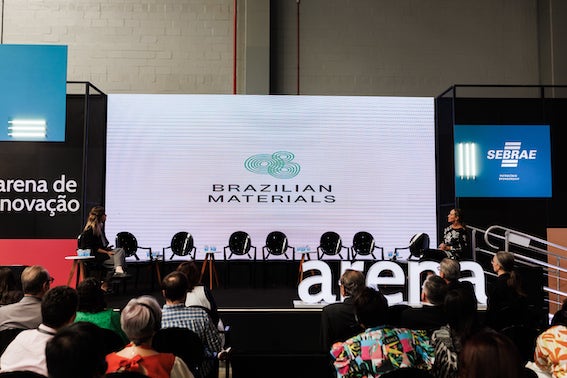Inspiramais, an exhibition that showcased over a thousand materials for the footwear, clothing, furniture, and jewelry industries took place from January 23 to 24 at the FIERGS Events Center in Porto Alegre, RS, Brazil, it was organized by Assintecal in partnership with the Center for the Tanning Industries of Brazil (CICB), the Brazilian Association of the Textile and Clothing Industry (Abit), and the Brazilian Association of Furniture Industries (Abimóvel). The event was conducted by the Brazilian Materials program and sponsored by the National Sebrae.
Welum had the opportunity to talk to Silvana Dilly, the superintendent of the Brazilian Association of Companies for Leather, Footwear, and Artifacts Components (Assintecal) about two projects that were promoted during Inspiramais.
Tell us about the contest ecoAR contest, where did this idea come from?
Arezzo&Co is a company that is a reference in the design part of Brazil, Arezzo has been working on the Inspiramais leather preview project for years, and all the footwear is from Arezzo.
The company developed a contest and launched a challenge for small companies that could present innovative solutions in sustainability, around 220 solutions were presented, from all states of Brazil. The enterprise awarded 5 winners, one of them was here at the event, Sioduhi Piratapuya, with the ManioColor technology, which develops natural dye from cassava shavings. Arezzo is a very innovative company, it decided to present the exhibition of these projects in Inspiramais because it is an event that has fashion content, sustainability, innovation, and design. The idea is that other companies see what they are doing and can replicate it. Because it is sought that not only one or two companies have sustainable products but the entire production chain of fashion, Arezzo seeks to contribute to the Brazilian sector.
What is the Brazilian Materials program about?
Formerly called By Brasil Components, Machinery, and Chemicals, the program is now called Brazilian Materials, the new brand of the export program promoted by Assintecal in partnership with ApexBrasil was launched during Inspiramais.
Brazilian manufacturers that are part of the components sector interested in expanding their commercial relations with the foreign market had the opportunity to participate, as well as 300 other companies that aimed to promote good performance in exports and, consequently, in the sector. The project has adequate solutions for each level of internationalization, keeping commercial promotion, intelligence, and training, among others, within the reach of companies.
We have this export brand, in addition to exporting footwear, we export materials, and we are a reference in Latin America. The Brazilian Materials brand has three pillars of sustainability: social, economic, and environmental, the green color of the Brazilian Materials brand represents the color of sustainability. When we think of design we think of Italy, when we think of technology: Germany, and we want when people think of sustainability, it comes to mind: Brazil. Italians have made in Italy because they have strong brands that transform the fact in Italy, Spain is a leader in Fast Fashion because it has a very strong brand that is Zara, so Brazil is working to be recognized for sustainability by having strong brands abroad. Strong brands are what give that branding Made in Brasil.
Piccadilly: An example of sustainability and gender equity in the fashion industry.
Within the framework of Inspiramais, a complementary visit to the Brazilian company Piccadilly took place for fashion leaders and international journalists, Morgana Marca, Coordinator of ESG and sustainability, leader of innovation and sustainability of Piccadilly, explained to the attendees the history of the company and its sustainable and gender equity initiatives.
The enterprise is a leader in the footwear industry, recognized not only for its high-quality products but also for its commitment to sustainability. Over the past few years, it has embarked on an evolutionary journey to ensure that Piccadilly is making a difference when it comes to environmental, social, and governance issues. Its products are sold at more than 21,000 points of sale in Brazil and all over the world.
Some of the achievements of the company are:
- It offsets 100% of our greenhouse gas emissions
- it assesses 45.5% of its key raw material and input suppliers
- 64% of waste is recycled
- 36% of leading positions are held by women
- 37 tons of waste are reprocessed into PICCADILLY products such as soles and insoles
- 18% of its raw materials from renewable or recycled sources
Gender equity is one of Piccadilly’s priorities in its organizational structure, especially in leadership positions. As a result, 50% of its senior management positions are held by men and 50% by women, It should be noted that for the first time in the history of the company, there is a female president: Cristine Grings Nogueira.





